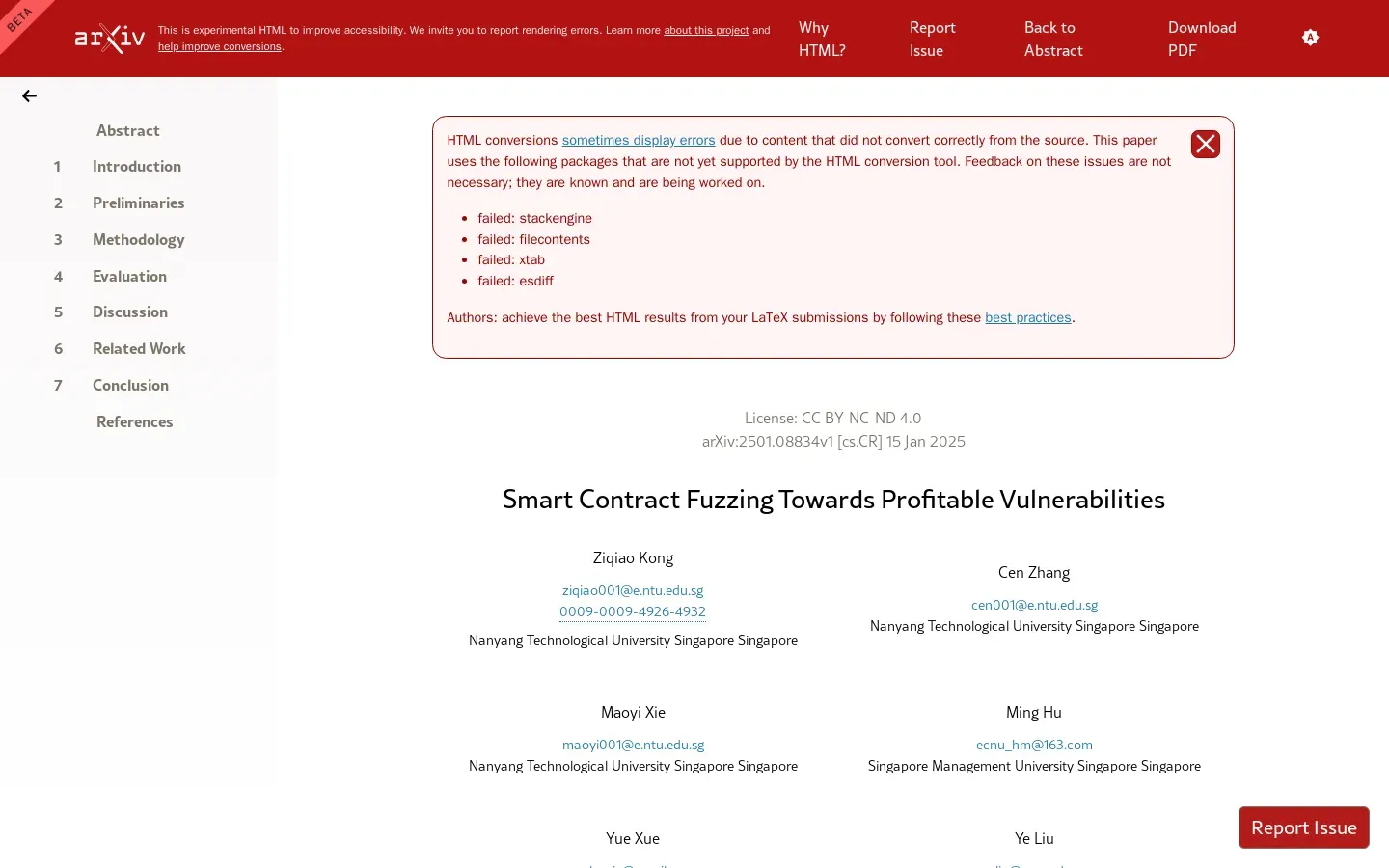
Advancements in Smart Contract Fuzzing with Verite Tool
/ 4 min read
Quick take - The Verite framework, a new fuzzing tool designed to enhance smart contract security in decentralized finance, employs advanced techniques for automated vulnerability detection and profitability analysis, aiming to improve the overall safety and compliance of blockchain applications.
Fast Facts
-
Introduction of Verite Framework: A novel fuzzing tool designed to enhance smart contract security in the decentralized finance (DeFi) sector, focusing on vulnerability detection and profitability maximization.
-
Automated Vulnerability Detection: Verite outperforms existing fuzzers by identifying zero-day vulnerabilities, enabling proactive risk mitigation.
-
Gradient Descent-Based Profit Maximization: This method helps recognize profitable vulnerabilities, allowing developers to prioritize remediation based on financial implications.
-
Integration of Advanced Techniques: Features like action-based mutators, real-time monitoring, and cross-chain vulnerability detection enhance transaction exploration and ongoing security assessments.
-
Future Directions: Plans for expansion to other blockchain ecosystems, machine learning integration for adaptive fuzzing, and development of advanced profitability analysis tools for auditors.
In the ever-evolving landscape of blockchain technology, where decentralized finance (DeFi) applications are rapidly reshaping the financial ecosystem, the need for robust security measures has never been more critical. As smart contracts become integral to these decentralized applications, vulnerabilities can lead not only to financial loss but also to regulatory scrutiny and reputational damage. Enter Verite, a groundbreaking fuzzing framework that promises to elevate the security of smart contracts through innovative techniques and methodologies. The research surrounding Verite sheds light on its multifaceted approach, which intricately weaves together automated vulnerability detection, profitability recognition, and real-time monitoring to create a comprehensive safety net for DeFi environments.
One of the standout features of Verite is its automated vulnerability detection capabilities, which significantly enhance the effectiveness of identifying weak spots in diverse smart contracts. By employing advanced fuzzing techniques—including action-based mutators that optimize transaction exploration—Verite not only pinpoints vulnerabilities but does so with an efficiency that surpasses existing state-of-the-art tools. This capability is vital in a sector where even minor oversights can lead to catastrophic outcomes. Furthermore, Verite’s integration with continuous security monitoring systems solidifies its role as a proactive defender against potential threats, allowing developers and auditors alike to stay ahead of malicious actors.
The framework doesn’t stop at vulnerability detection; it also introduces gradient descent-based profit maximization methods. This innovative approach enables smart contract developers to recognize profitable exploitation avenues during the fuzzing process. By focusing on fund flow analysis and enhancing profitability metrics in security assessments, Verite empowers developers to not only secure their contracts but also understand the financial implications of vulnerabilities. This dual focus on security and profitability marks a significant shift in how smart contracts are audited and maintained.
As DeFi continues to gain prominence, the implications for regulatory compliance and risk management cannot be overstated. Verite’s methodologies provide a pathway for developers to align their projects with emerging regulatory standards by offering enhanced accountability through on-chain profit accounting. This aspect facilitates clearer tracking of financial flows associated with smart contracts, thereby fostering trust among users and regulators alike. In this context, the framework also opens up avenues for collaboration with decentralized finance auditing platforms, potentially leading to industry-wide standardization in vulnerability assessment practices.
Yet no innovation comes without its limitations. The research highlights areas ripe for further exploration, such as integrating machine learning for adaptive fuzzing and developing dynamic step optimization techniques that could refine how vulnerabilities are detected across various blockchain ecosystems. Additionally, exploring cross-chain vulnerability detection could be pivotal as interoperability becomes increasingly common in blockchain applications.
Looking ahead, the potential applications for Verite are expansive. The integration of real-time monitoring and automated response systems could revolutionize how organizations manage cybersecurity threats in DeFi environments. As adaptive optimization techniques evolve, they may provide even deeper insights into vulnerability landscapes while enhancing overall contract security.
In conclusion, Verite stands as a beacon of innovation in an industry fraught with challenges. Its blend of advanced fuzzing techniques, automated detection mechanisms, and proactive profit analysis positions it as a formidable ally for developers navigating the complexities of blockchain security. As we anticipate future developments in this space, it is clear that frameworks like Verite will play an instrumental role not only in fortifying smart contracts against current threats but also in shaping a more secure and resilient blockchain ecosystem for years to come.



